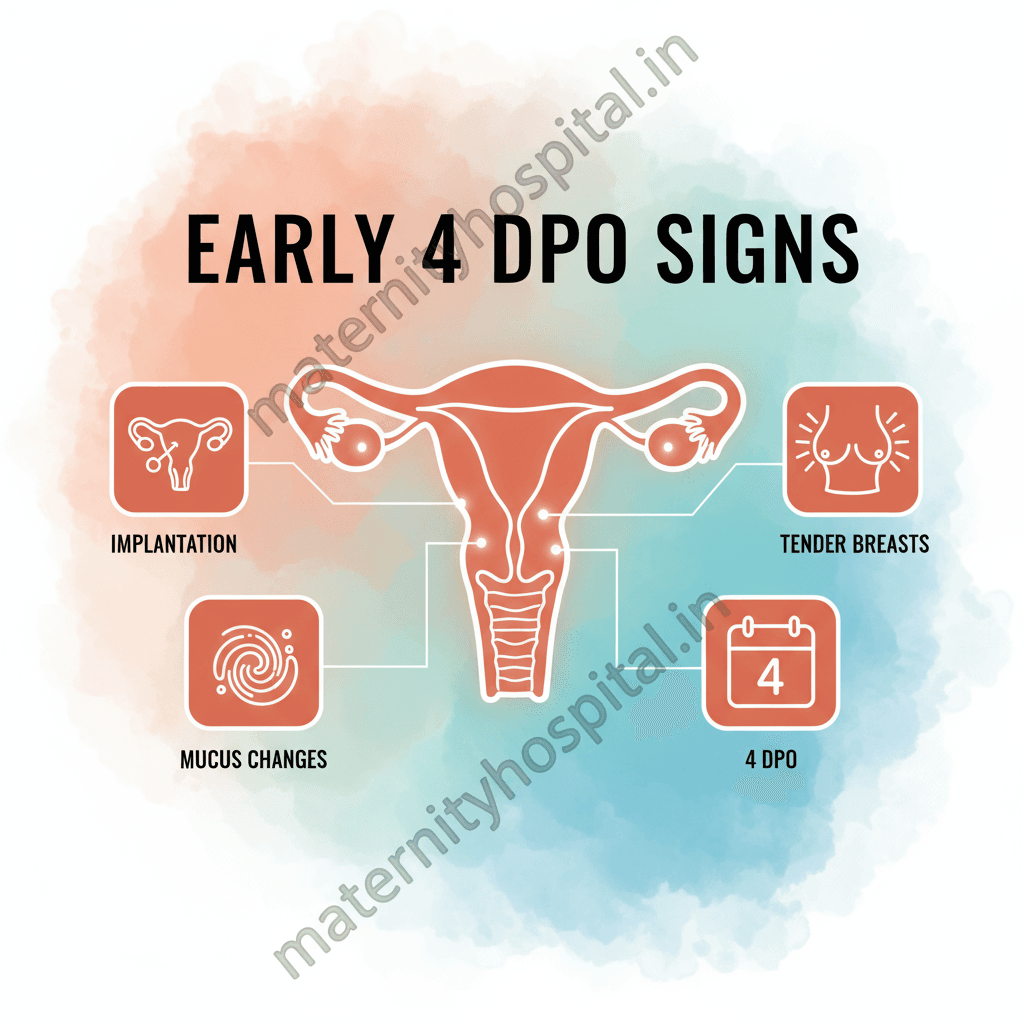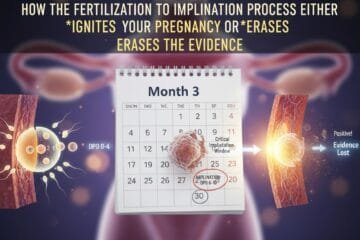
Early 4 DPO Signs: Your Guide to the Two-Week Wait
The First Glimmer – What to Know About Early 4 DPO Signs
When you’re trying to conceive, the days right after ovulation can feel like a high-stakes waiting game. You might find yourself hyper-aware of every little change, hoping your body is sending a signal. This is especially true at 4 days post-ovulation (4 DPO). While it might seem too soon, many women report noticing subtle changes, and these Early 4 DPO Signs are a hot topic in online communities.
It’s crucial to understand the science behind these sensations. At 4 DPO, your body is in the luteal phase, preparing for a potential pregnancy. The fertilized egg (if conception occurred) is still on its journey to the uterus; it hasn’t implanted yet. Implantation, the event that officially starts a pregnancy, typically happens between 6 and 12 DPO. This means your body isn’t producing the pregnancy hormone, hCG.
So, any symptoms you feel aren’t from pregnancy itself. Instead, they come from the natural rise of progesterone—a hormone that prepares your uterus. Progesterone is vital for a potential pregnancy, but its effects on your body can easily mimic early pregnancy symptoms.
Think of Early 4 DPO Signs as potential clues, not definitive proof. A real confirmation can only come from a positive pregnancy test, which you can take after implantation has had a chance to occur. This article will help you understand common 4 DPO symptoms and how they fit into the bigger picture of the two-week wait.
Navigating the Nuances of Early 4 DPO Signs
When you are searching for Early 4 DPO Signs, it’s important to differentiate between what is a normal bodily function and what might be a real clue. The hormonal environment at 4 DPO is rich with progesterone, and this hormone is the main cause of any noticeable changes. It’s also the reason why many of these 4 days past ovulation signs are so similar to common premenstrual syndrome (PMS) symptoms.

Common Physical Sensations at 4 DPO:
1. Mild Cramping or Pelvic Twings:
- What it feels like: You might feel a faint, dull cramping or a slight pulling sensation in your lower abdomen. It’s often not painful, but rather a subtle awareness of your pelvic region.
- Why it happens: This is most likely a residual effect of ovulation itself. The release of the egg can cause minor discomfort. Alternatively, rising progesterone can cause the uterus to soften and expand slightly, leading to these feelings.
- Active Voice: Rising progesterone levels cause mild cramps.
- Passive Voice: Mild cramps are caused by rising progesterone levels.
2. Breast Sensitivity or Tenderness:
- What it feels like: Your breasts may feel sore, heavier, or more sensitive than usual. Even a light touch can feel uncomfortable.
- Why it happens: This is a hallmark symptom of rising progesterone. The hormone stimulates blood flow and fluid retention in the mammary glands, causing them to swell and become tender. This is one of the most common early pregnancy signs, but it’s not exclusive to pregnancy at 4 DPO.
- Active Voice: Progesterone makes your breasts tender.
- Passive Voice: Breast tenderness is produced by progesterone.
3. Changes in Vaginal Discharge:
- What it feels like: You might notice your discharge is thicker, creamier, or more lotion-like than it was during ovulation.
- Why it happens: After ovulation, progesterone causes cervical mucus to become thick and sticky. This forms a protective barrier to a potential pregnancy. While some people look for this as a sign, it’s a natural and normal change in a regular menstrual cycle.
- Active Voice: You may notice a change in your discharge.
- Passive Voice: Changes in discharge may be noticed by you.
Other Common Physical Sensations at 4 DPO:
4. Fatigue or Drowsiness:
- What it feels like: An unusual sense of being tired, even after getting a full night’s sleep.
- Why it happens: Progesterone has a known sedative effect on the body. A sudden increase in this hormone can make you feel sleepy and lethargic, which is why fatigue is one of the most common 4 days post ovulation symptoms reported by women.
- Active Voice: The hormone progesterone makes you tired.
- Passive Voice: You may feel tired because of the hormone progesterone.
5. Emotional Changes or Mood Swings:
- What it feels like: You might feel more irritable, emotional, or find yourself experiencing sudden mood swings without a clear reason.
- Why it happens: Hormonal fluctuations can have a direct impact on your mood. The rise in progesterone in the luteal phase can influence brain chemistry, leading to these emotional changes.
It is absolutely crucial to understand that these Early 4 DPO Signs are not caused by a pregnancy itself. Implantation, the event that truly kicks off a pregnancy, has not yet occurred. Instead, these symptoms are a normal part of your body’s preparation for a potential pregnancy, a process that happens every cycle.
The Science of the Luteal Phase and 4 DPO
To gain a deeper understanding of the Early 4 DPO Signs, let’s look at the scientific process happening in your body. This stage is known as the luteal phase, and it’s a time of immense hormonal activity.
The key player is the corpus luteum, which is the remnant of the ovarian follicle that released the egg. The corpus luteum begins to produce large amounts of progesterone.
Here is what progesterone does to your body:
- Prepares the Uterus: Progesterone works to thicken the uterine lining (endometrium), making it soft, rich with blood vessels, and a perfect place for a fertilized egg to implant.
- Sustains the Lining: If a pregnancy occurs, the corpus luteum will continue to produce progesterone to sustain the uterine lining. Without pregnancy, it will eventually degrade, causing progesterone levels to fall and leading to your menstrual period.
Implantation and the Rise of hCG:
- Implantation Timeline: It is not possible for a fertilized egg to implant as early as 4 DPO. The journey from the fallopian tube to the uterus takes time. The average implantation timeline is from 8 to 10 DPO.
- hCG Production: The pregnancy hormone, Human Chorionic Gonadotropin (hCG), is only produced after successful implantation. This hormone is the basis of all home pregnancy tests.
- No hCG at 4 DPO: Since implantation has not yet occurred, there is no hCG in your system. This means that any symptoms that are directly caused by hCG, such as severe nausea or a metallic taste in the mouth, are extremely unlikely at this stage.
Understanding this biological timeline is essential. It helps you manage the mental and emotional stress of the two-week wait by providing a realistic view of what is happening inside your body. It is a time for patience, not for making conclusions based on ambiguous symptoms.
Lifestyle Tips for the Two-Week Wait
Navigating the early stages of the two-week wait can be a challenge. At 4 DPO, your focus should shift from looking for early pregnancy signs to supporting your body and mind in the best possible way.
Here are some lifestyle tips to help you manage this period:
1. Maintain a Healthy Lifestyle:
- Eat Nutritious Foods: Continue to eat a balanced diet. Focus on healthy foods, like leafy greens, whole grains, and lean proteins, and stay away from processed foods and excessive sugar.
- Stay Hydrated: Drink plenty of water throughout the day.
- Engage in Light Exercise: Continuing your regular, moderate exercise routine is usually fine. This can include activities like walking, swimming, or gentle yoga. Avoid intense or new workouts.
2. Manage Stress and Anxiety:
- Practice Mindfulness: Consider meditation or deep breathing exercises. These can help to calm your mind and reduce the feeling of stress and anxiety.
- Find Distractions: Engage in hobbies you love. Read a book, work on a puzzle, or spend time with friends. Finding a way to take your mind off the wait is a key to survival.
- Journaling: Writing down your thoughts and feelings can be a helpful way to process emotions and reduce anxiety.
3. What to Avoid:
- Alcohol and Smoking: It is best to avoid alcohol and smoking completely when you are trying to conceive.
- Excessive Caffeine: Limit your caffeine intake.
- Early Pregnancy Tests: Resist the urge to take a pregnancy test at 4 DPO. A test at this time will be inaccurate and will likely only lead to disappointment.
By focusing on these lifestyle tips, you are not only supporting a potential pregnancy but also prioritizing your own well-being, which is an important step in this journey.
When to Take a Test & Official Resources
One of the most pressing questions during this time is “When can I take a pregnancy test?” This is where understanding the science of the luteal phase truly helps.
The Correct Testing Window:
- Since hCG is not produced until after implantation, and implantation happens between 6 and 12 DPO, you should wait until at least 10 DPO to use an early-detection test.
- The most accurate time to test is on the day of your missed period. Waiting for this day will give you the most reliable result and help you avoid the false negatives that can be so disheartening.
What a Negative Test at 4 DPO Means:
A negative pregnancy test at 4 DPO means nothing. There is no hCG in your body to be detected.
Official Links and Resources:
For reliable information on fertility and early pregnancy, we recommend consulting these trusted organizations:
- American College of Obstetricians and Gynecologists (ACOG): https://www.acog.org/
- National Institutes of Health (NIH) – Pregnancy: https://www.nichd.nih.gov/health/topics/pregnancy
- Planned Parenthood: https://www.plannedparenthood.org/learn/pregnancy/pregnancy-tests
Frequently Asked Questions
Here are some common questions about Early 4 DPO Signs to help clarify your understanding during this sensitive time.
Q1: Is it possible to be pregnant at 4 DPO? A: You may have conceived, but a fertilized egg has not implanted yet. It is not possible for a fertilized egg to implant at 4 DPO. Implantation, which makes you clinically pregnant, happens later in the luteal phase.
Q2: Will I get a positive pregnancy test at 4 DPO? A: No, it is not possible to get a positive pregnancy test at 4 DPO. Pregnancy tests detect the hormone hCG, and hCG is only produced after implantation has occurred. This has not happened by 4 DPO.
Q3: Why am I having symptoms if I’m not technically pregnant yet? A: The symptoms are caused by the hormone progesterone, which rises after ovulation. It prepares your body for a potential pregnancy and causes symptoms like breast sensitivity and fatigue, regardless of whether you’re pregnant.
Q4: Can these symptoms be confused with PMS? A: Yes, the vast majority of early 4 DPO signs are identical to PMS symptoms. This is because the same hormonal fluctuations cause both. It is very difficult, and often impossible, to tell the difference this early in your cycle.
Q5: Is a lack of symptoms at 4 DPO a bad sign? A: Not at all. Many women who go on to have healthy pregnancies experience no symptoms at all during the entire two-week wait. The lack of 4 DPO symptoms is completely normal.
Q6: Can I have implantation bleeding at 4 DPO? A: Implantation bleeding typically occurs between 6 and 12 DPO, with 8-10 DPO being the average. It is extremely rare to experience implantation bleeding at 4 DPO.
Conclusion – A Time for Patience and Self-Care
As we conclude this in-depth guide to Early 4 DPO Signs, it’s clear that this stage of the two-week wait is a unique mix of anticipation and scientific reality. The symptoms you may feel—from mild cramping to changes in mood—are not definitive 4 dpo signs of pregnancy. They are, instead, a powerful reminder of your body’s incredible ability to prepare for life, a process led by the hormone progesterone.
By understanding the scientific timeline—that implantation and hCG production happen later—you can approach this time with more peace and patience. Instead of viewing every sensation as a potential sign, you can embrace the waiting game with a focus on your own health and well-being. Continue to nourish your body, limit stress, and find joy in the present moment. These actions are beneficial regardless of the outcome of this cycle.
Remember, a positive result will only show up on a pregnancy test after implantation has occurred. Until then, the most important thing you can do is to be kind to yourself. Trust the process, trust your body, and know that you are doing everything right.










